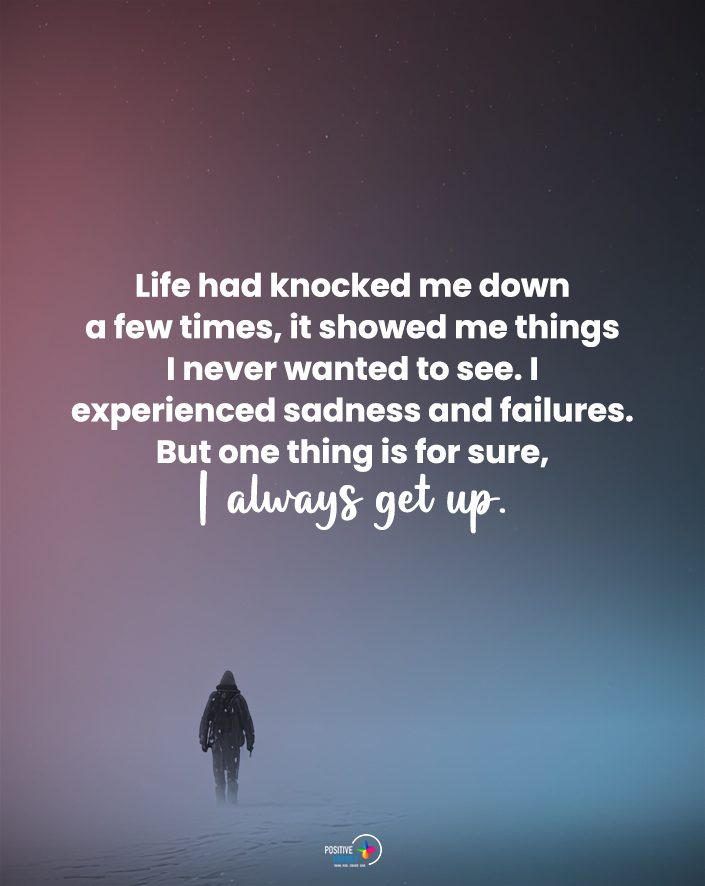Here’s what happens when you become more open to making changes in life.
Imagine yourself as a delicate, fuzzy caterpillar, inching along life’s many branches. Over time, you find a comfortable spot, create a cozy cocoon, and eventually emerge as a vibrant butterfly. That transformation is much like the journey of personal growth.
It’s about evolving and shedding old layers. Only then can you flutter away into a brighter, more mature version of yourself.
Not everyone’s transformation looks the same. That’s perfectly okay. Every butterfly flaunts its own unique set of colors. So, if you’re wondering whether you’re on the brink of such a metamorphosis, keep reading.
We’ve got twelve signs that might resonate with you. Let’s explore this together and see if you can spread those wings.
Twelve Signs You’re Ready for Personal Growth in Your Life
1. Acknowledgment of Stagnation
This sign feels like the lingering feeling stuck in the same place. You might repeat the same harmful patterns or move in aimless circles. It might also feel like a treadmill – running without getting anywhere. It could be the job you’ve been in for years that no longer excites you, or it could be a routine that’s become too monotonous.
So, how do you get unstuck?
- Self-reflection: Take a moment, perhaps at the start or end of your day, to assess where you are versus where you want to be. A positivity journal can be an incredibly effective tool for this.
- Seek External Views: Sometimes, discussing your feelings with trusted friends or family members can offer a fresh perspective. They might see things you overlooked.
- Set Small Goals: Identify one area where you feel most stagnant. Then, set a minor, achievable goal to change it. It could be as simple as driving a different route to work or trying a new hobby.
2. Increased Self-Awareness
As you grow, you might awaken to things about yourself you previously never noticed. That could be understanding your emotional triggers, recognizing your strengths and weaknesses, or pinpointing habits you want to change.
You might wonder how to continue to nurture this self-awareness. Try these:
- Meditation: Regular meditation can increase mindfulness. Thus, you learn to tune in to your thoughts and feelings more deeply.
- Feedback: Ask close friends or colleagues for constructive feedback about yourself. It can help highlight areas of improvement you might never have realized.
- Personality Tests: Tools like the Myers-Briggs Type Indicator offer insights into your personality traits. It also helps you see how they might influence your behavior.
3. Desire for New Experiences
Do you daydream about places you’ve never been, skills you’ve never tried, or even cultures you’ve never experienced? This yearning is more than just wanderlust or curiosity—it’s a deep-seated desire to stretch your boundaries and experience the unknown.
How do you satisfy the desire to try new things?
- Travel: Visit a place you’ve never been before. It doesn’t have to be a far-off country; even a nearby town or city can offer a fresh perspective.
- Take a Class: Dive into a new hobby or master a life skill. Whether pottery, a new language, or even dance, immersing yourself in new learnings can feed your soul.
- Cultural Exploration: Attend local cultural events or festivals. These give a dual benefit of learning something new and broadening your understanding of diverse cultures.
4. Being Open to Feedback
It’s one thing to ask for opinions. However, it’s entirely different to genuinely be receptive to them if they challenge your current or past views. It’s also challenging if they critique something personal. If you find yourself more accepting of feedback without defensiveness, you’re on the way to immense personal growth.
Try these things to become more open:
- Active Listening: When receiving feedback, truly listen without immediately formulating a response. That ensures you understand others more clearly.
- Seek Mentorship: Find someone in your field or area of interest who can provide guidance and regular feedback. A mentor can be invaluable in your growth journey.
- Feedback Journal: Keep a journal where you note down feedback received. Periodically review it to track your progress and areas of improvement.
5. Understanding the Importance of Change
Life is not static. Do you find yourself increasingly understanding that change isn’t just inevitable but also essential for growth? Then, you’re on the right track. You realize that life brings new opportunities, even if it sometimes feels uncomfortable or challenging.
Here’s how you can nurture this openness to change:
- Read Inspirational Stories: Engage with biographies or articles about people who embraced change and flourished. Their journeys can serve as motivation.
- Embrace Small Changes: Start by making minor alterations in your daily routine, like rearranging your room or trying a new cuisine. That can help acclimate you to more significant life changes down the road.
- Reflect on Past Changes: Think back to significant changes in your past. Those moments, even if they seemed wrong for you at the time, led to personal growth and new opportunities – even if you didn’t know it then.
6. Increasingly Questioning Yourself
It might sound counterintuitive, but questioning yourself isn’t always negative. If you ponder deeper questions about your life, values, and direction, it reveals a hunger for clarity and understanding. It’s a quest for purpose and meaning beyond the surface.
So, how do you continue on this path to personal growth?
- Engage in Deep Conversations: Find friends or groups where you can discuss life’s big questions. Different perspectives can provide clarity and further refine your thoughts.
- Journal Your Thoughts: Writing down your questions and thoughts can provide a roadmap of your internal dialogue and highlight areas you’re curious about.
- Read Self-Development Books: Explore philosophical or self-help literature. If you’re ready, pick up my best-selling book, The Comfort Zone, to give you insights into nurturing your personal growth.
7. Seeking Knowledge and Wisdom
You find yourself with an insatiable thirst for knowledge. You long not only for career advancement or book knowledge. Instead, you seek to understand the world and your place in it. You’re attracted to books, seminars, or documentaries.
These are tools to use to expand your horizons:
- Dedicate Time to Reading: Set aside specific times during the week dedicated to reading. It could be books, reputable online articles, or academic papers.
- Join a Book Club: This not only encourages reading but also facilitates discussions. In fact, it allows you to understand different perspectives.
- Attend Workshops or Seminars: These can be in-person or online. They’re a great way to deep dive into specific subjects and interact with experts.
8. Trying to Let Go of Old Grudges in Your Life
Holding onto past hurts and resentments can be mentally and emotionally draining. If you want to release these feelings and make peace with past events, you align with a path of healing and personal growth.
But how can you release the remnants of these past hurts?
- Practice Forgiveness: It’s essential to understand that forgiving someone isn’t just for them. It is necessary for your peace of mind. It doesn’t mean forgetting or justifying their actions. Instead, it means releasing the hold those feelings have on you.
- Seek Therapy or Counseling: A professional can provide techniques and guidance on navigating complex feelings and finding closure.
- Write a Letter: Penning your feelings, even if you never send the letter, can be therapeutic. It allows you to articulate and process your emotions.
9. Taking Responsibility for Your Actions
Instead of pointing fingers at others regarding your circumstances, you have started to see your role in situations. Accepting responsibility for both your successes and missteps indicates maturity. It also reveals a readiness for growth. It’s about owning up to your decisions and understanding their consequences.
Here’s how you can continue on this path:
- Reflect Before Reacting: When situations arise, take a moment to assess your involvement. Did your actions or decisions contribute to the outcome? If so, how?
- Apologize When Necessary: If you recognize that you were at fault, offer a genuine apology. That not only mends bridges but also reinforces personal accountability.
- Seek Feedback: Regularly ask trusted individuals around you about your behavior and decisions. They might provide insights about how you can improve.
10. Re-evaluating Relationships
As you grow, you may find that not all relationships—friendships, family ties, or romantic—align with your evolving values and aspirations. Re-evaluating these connections to ensure they are supportive and positive is critical to personal growth.
So, how can you determine if your relationships support your trajectory?
- Assess Relationship Value: Reflect on whether your relationships uplift you or align with your personal growth. If not, it might be time to reconsider their place in your life. That doesn’t mean you ghost people, but perhaps it’s time to limit interactions with toxic people.
- Engage in Open Conversations: Before making any decisions, discuss your feelings with the person involved. They might also feel the same way, or there could be room for mutual growth.
- Prioritize Self-Care: It’s essential to remember that it’s okay to distance yourself from relationships that drain or harm you mentally or emotionally.
11. Embracing Vulnerability
Being vulnerable doesn’t mean you are weak. It’s about opening up, showing your authentic self, and not being afraid to express yourself. If you now understand that vulnerability can lead to deeper connections and genuine experiences, you’re on a path of personal growth.
Here’s how you can continue to open up:
- Practice Open Communication: Share your feelings or concerns with someone you trust. That makes way for more profound, authentic interactions.
- Engage in Self-reflection: Ask yourself why some topics or emotions make you uncomfortable. Understanding why can help you address and embrace them.
- Seek Supportive Communities: Join groups or workshops on emotional intelligence. Being in a supportive environment can make embracing vulnerability easier.
12. Setting Boundaries
Recognizing the importance of setting boundaries in relationships, work, or personal time signals an understanding of your worth. It means you value your time, energy, and mental well-being and are ready to advocate for them.
Continuing to sharpen your boundary-setting skills:
- Define Your Limits: Understand what you’re comfortable with and what crosses the line. It could be how much you work outside office hours or how often you’re available for social engagements.
- Communicate Clearly: Once you know your boundaries, communicate them assertively but respectfully. Ensure those around you are aware.
- Stay Consistent: It’s crucial to maintain the boundaries you set. It might be challenging initially, especially if you’re not used to it. But consistency will help support your success.
Pitfalls to Avoid in Your Personal Growth Journey
While the journey of personal growth is enriching. Still, it’s not without its challenges. Here are some common pitfalls to watch out for and how to navigate them:
1. Comparison with Others Impedes Your Personal Growth:
It’s natural to look at others and measure your progress against theirs. However, remember that every individual is on a unique path, with distinct experiences and challenges.
Solutions:
- Focus on your journey and celebrate your milestones.
- Understand that everyone has their own pace and challenges.
2. Overloading Yourself Hinders Personal Growth:
With the enthusiasm to grow, there’s a risk of taking on too much at once. That can cause burnout and loss of motivation.
Solutions:
- Prioritize tasks and goals.
- Ensure you set realistic expectations and give yourself time to relax and recharge.
3. Fear of Failure Diminishes Personal Growth:
The fear of making mistakes causes some to freeze. But failures are inevitable in life. In fact, they often provide the most valuable lessons.
Solutions:
- Embrace failures as learning opportunities.
- Seek feedback and use it constructively to improve.
4. Neglecting Self-Care May Impede Personal Growth:
In pursuing growth, you might push yourself too hard and neglect your well-being.
Solutions:
- Regularly check in with your emotional, mental, and physical states.
- Engage in self-care practices consistently.
5. Being Close-minded Harms Personal Growth:
Growing requires an open mind. If you’re resistant to new ideas or perspectives, it can hinder your development.
Solutions:
- Engage in activities that challenge your belief system and perceptions.
- Seek out diverse perspectives and be receptive to feedback.
6. Procrastination Decreases Personal Growth:
Putting off tasks or decisions can delay your progress and lead to missed opportunities.
Solutions:
- Set clear, actionable goals.
- Break tasks into manageable chunks and tackle them consistently.
Awareness of these pitfalls is half the battle. By recognizing them and having strategies to address them, you’ll better cope with the challenges of your personal growth. You’ll also continue on a path of consistent development and self-discovery.
Final Thoughts on Recognizing When It’s Time for Personal Growth
Just as the caterpillar undergoes a transformative journey to become a butterfly, we evolve through the phases of personal growth. There will be times of introspection and cocooning, where we might feel stuck or unsure. But it’s in these periods that the most profound growth often occurs. Beneath the surface, we evolve, readying for the next stage of our journey.
As you continue on your personal growth journey, may you find the strength and courage to embrace every twist and turn, knowing that just like the caterpillar, you, too, can make a beautiful transformation. Embrace the process, cherish every moment, and trust that your life journey leads you to your most authentic and vibrant self.

















 Community
Community

